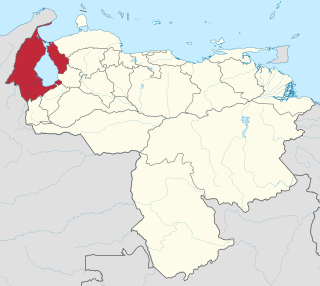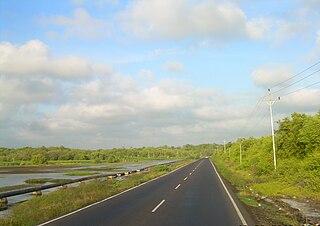
Venezuela is a country in South America, and part of the Caribbean South America, bordering the Caribbean Sea and the North Atlantic Ocean, between Colombia and Guyana. It is situated on major sea and air routes linking North and South America. Located at the northernmost end of South America, Venezuela has a total area of 916,445 km2 (353,841 sq mi) and a land area of 882,050 km2 (340,560 sq mi). It is the 32nd largest country, about twice the size of California. Shaped roughly like an inverted triangle, the country has a 2,800 km (1,700 mi) long coastline. It is bound on the north by the Caribbean Sea and the Atlantic Ocean, on the east by Guyana, on the south by Brazil, and on the west by Colombia. It has the 55th largest Exclusive Economic Zone of 471,507 km2 (182,050 sq mi). Its maritime territory borders Trinidad and Tobago, Dominica, the Dominican Republic, Grenada, St. Kitts and Nevis, St. Vincent and the Grenadines, France, the United Kingdom, the Netherlands, and the United States.

Zulia State is one of the 23 states of Venezuela. The state capital is Maracaibo. As of the 2011 census, it has a population of 3,704,404, the largest population among Venezuela's states. It is also one of the few states in Venezuela in which voseo is widespread.

Maracaibo is a city and the municipal seat of Maracaibo Municipality in northwestern Venezuela, on the western shore of the strait that connects Lake Maracaibo to the Gulf of Venezuela. It is the second-largest city in Venezuela, after the national capital, Caracas, and the capital of the state of Zulia. The population of the city is approximately 2,658,355 with the metropolitan area estimated at 5,278,448 as of 2010. Maracaibo is nicknamed "The Beloved Land of the Sun".

Lake Maracaibo is a large brackish tidal bay in Venezuela and an "inlet of the Caribbean Sea." It is sometimes considered a lake rather than a bay or lagoon. It is connected to the Gulf of Venezuela by Tablazo Strait which is 5.5 kilometres (3.4 mi) wide at the northern end. It is fed by numerous rivers, the largest being the Catatumbo. At 13,210 square kilometres (5,100 sq mi) it was once the largest lake in South America; the geological record shows that it was a true lake in the past, and as such is one of the oldest lakes on Earth at 20–36 million years old.

The Gulf of Venezuela is a gulf of the Caribbean Sea bounded by the Venezuelan states of Zulia and Falcón and by Guajira Department, Colombia. The western side is formed by the Guajira Peninsula. A 54 km (34 mi) strait connects it with Maracaibo Lake to the south.

The General En Jefe Rafael Urdaneta Bridge is located at the Tablazo Strait outlet of Lake Maracaibo, in western Venezuela. The bridge connects Maracaibo with much of the rest of the country. It is named after General Rafael Urdaneta, a Venezuelan hero of Independence.

Jean-David Nau, better known as François l'Olonnais, was a French pirate active in the Caribbean during the 1660s.

The Maracaibo Basin, also known as Lake Maracaibo natural region, Lake Maracaibo depression or Lake Maracaibo Lowlands, is a foreland basin and one of the eight natural regions of Venezuela, found in the northwestern corner of Venezuela in South America. Covering over 36,657 square km, it is a hydrocarbon-rich region that has produced over 30 billion bbl of oil with an estimated 44 billion bbl yet to be recovered. The basin is characterized by a large shallow tidal estuary, Lake Maracaibo, located near its center. The Maracaibo basin has a complex tectonic history that dates back to the Jurassic period with multiple evolution stages. Despite its complexity, these major tectonic stages are well preserved within its stratigraphy. This makes The Maracaibo basin one of the most valuable basins for reconstructing South America's early tectonic history.

The Archdiocese of Maracaibo is an Archdiocese in Venezuela. Since November 2000, its Archbishop has been Ubaldo Ramón Santana Sequera. The city of Maracaibo, the second largest in Venezuela, has a population of approximately 2,800,000. The Archdiocese covers a total area of 10,761 square kilometers in Zulia State.

The Catatumbo River is a river rising in northern Colombia, flowing into Lake Maracaibo in Venezuela. The Catatumbo River is approximately 340 kilometres (210 mi) long. It forms a part of the international boundary between the two countries.

Lago Oil & Transport Co. Ltd. had its beginning in 1924 as a shipping company carrying crude oil from Lake Maracaibo to its transshipment facility on the island of Aruba.

Catatumbo lightning is an atmospheric phenomenon in the country of Venezuela. It occurs over the mouth of the Catatumbo River where it empties into Lake Maracaibo.

Ciudad Ojeda is a city located in the northeastern shore of Lake Maracaibo in Zulia State in northwestern Venezuela. Its population as of the 2005 census was listed as 128,941.

The Bombardment of Fort San Carlos occurred during the Venezuelan Crisis on January 17, 1903, when two warships of the Imperial German Navy tried to penetrate into Lake Maracaibo but were repulsed by the garrison of Fort San Carlos de la Barra after a brief exchange of fire.
Paraujano is an Arawakan language spoken by the Paraujano, or Anu͂, people of Venezuela. The Paraujano live by Lake Maracaibo, Zulia State, in Northwest Venezuela.

San Carlos de la Barra Fortress is a seventeenth century star fort protecting Lake Maracaibo in Venezuela.

The Catatumbo moist forests (NT0108) is an ecoregion in Venezuela and Colombia to the west and east of Lake Maracaibo. It includes four regions of moist forest on slightly higher ground than the dry forest and mangroves that surround the lake. The forest has unique flora related to the flora of the Amazon basin. It is badly degraded due to farming, livestock grazing and oil exploration.

The Maracaibo dry forests (NT0222) is an ecoregion in Venezuela around Lake Maracaibo. It contains the country's main oil fields. The habitat is criss-crossed by roads and is severely degraded by farming and livestock grazing.
Kerui Petroleum is a Chinese oil services and equipment company. It provides equipment and EPC services for oil drilling and production and natural gas plants.
An energy collapse in the state of Zulia, Venezuela occurred as a result of the country's ongoing general crisis, and it is the largest of its kind in the history of the state. With previous events in 2015 and 2016, the collapse intensified in 2017, when in September an alleged theft of cables left the city of Maracaibo and its surroundings without electricity. Since then long and short-term blackouts have been reported, which also cause the suspension of water supply, failures in cable television, telephone coverage and Internet access, among other services, as well as difficulty conducting business transactions, caused by the scarcity of banknotes and the dependence on the large-scale use of the point of sale terminals as well as electronic payments that are deficient in the absence of electricity and the Internet, resulting in closing of establishments, absence of work, damage of food and electrical appliances, the decrease in quality of life, among other factors, which added to the high temperatures suffered by citizens, affect the normal development of the population. Authorities such as the national government and the government of Zulia have attributed these failures to an alleged sabotage, but the opposition and experts denounce that it is due to lack of maintenance, also arguing that only less than half of what is consumed regularly is produced, reason for which there is "cargo administration" (rationing). The National Assembly of Venezuela, of opposition majority, declared the region in a state of electrical emergency. The service has also been interrupted but to a lesser extent in other states such as Bolívar, Carabobo, Falcón, Mérida, Miranda, Nueva Esparta, Táchira, Vargas and the country's capital Caracas.
















